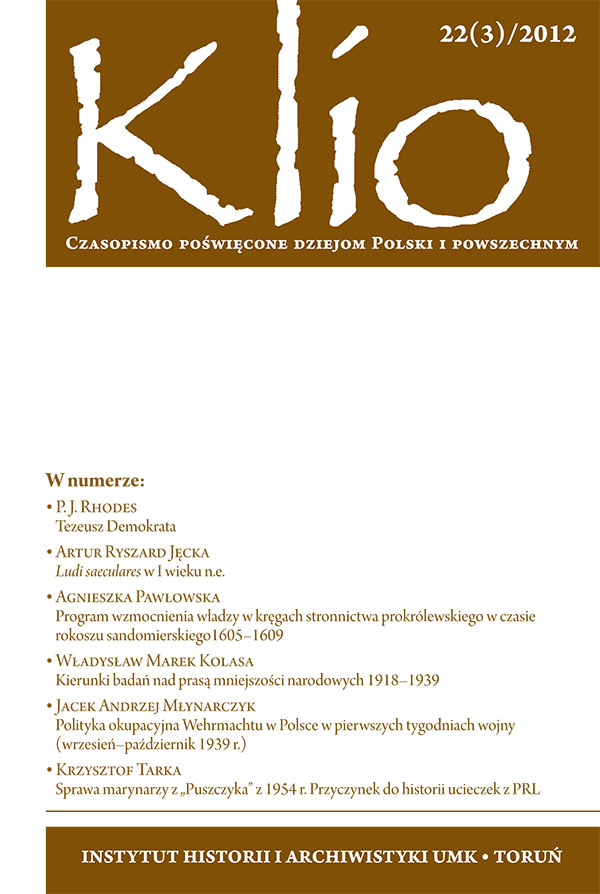Ludi saeculares w I wieku n.e.
DOI:
https://doi.org/10.12775/KLIO.2012.039Abstrakt
Secular Games were restored by Augustus in 17 B.C. The Games continued to be celebrated under the later emperors, but two different systems of calculation were used to determine their dates. Claudius held them in A.D. 47, to celebrate the 800th year from the foundation of Rome. Domitian held his in A.D. 88. Under subsequent emperors, Secular Games were celebrated on both systems. Domitian was followed by Septimus Severus in A.D. 204, 220 years from the Augustan celebration. Antoninus Pius in A.D. 148 and Philip the Arabian in A.D. 248 followed Claudius in celebrating 100-year anniversaries of Rome’s foundation. In A.D. 204 the procedure used in 17 B.C. was followed closely, but Secular Games organized in A.D. 148 and A.D. 248 involved rituals at the Temple of Venus and Roma, and the date was probably changed to April 21, Parilia. There is not many information about Secular Games organized in the First Century. These celebrations were mentioned by Tacitus, Suetonius, Censorinus, Martialis, Statius, Aurelius Victor and Zosimos, but they do not passed on some of information about their sequences of events. Ancient historians were mainly interested in their different systems of calculation. We have got coins commemorating Secular Games organized by Domitian and few inscriptions, too. We can try to reconstruct Games from the First Century, but the most important is to understand that there were initiated two different cycles of Secular Games.
Bibliografia
Aurelius Victor, De Caes.: Aureliusz Wiktor, Księga o cezarach, przekł. P. Nehring, B. Bibik przy współpr. J. Skorackiej oraz P. Woźniczki, [w:] Brewiaria dziejów rzymskich, Warszawa 2010.
Cass. Dio: Dio’s Roman History, przekł. E. Cary, Cambridge–Massachusetts–Londyn 1982–1990.
Censorinus, De die natali: Censorinus, De die natali, Lipsk 1867.
Martial., Epigrammata: Martialis, Epigrammata, Lipsk 1901.
Plin., Natural. hist.: Pliniusz Starszy, Natural History, przekł. H. Rackham, Cambridge–Massachusetts–Londyn 1986–1992.
Statius, Silv.: Stacjusz, Sylwy, przekł. S. Śnieżewski, Kraków 2010.
Suet.: Swetoniusz, Żywoty Cezarów, przekł. J. Niemirska-Pliszczyńska, Wrocław 1987.
Tac., Ann.: Tacyt, Roczniki, przekł. S. Hammer, [w:] Dzieła, Warszawa 2004.
Zosim., Historia nova: Zosimos, Nowa historia, przekł. H. Cichocka, Warszawa 1993.
Beard, North, Price 1998: M. Beard, J. North, S. Price, Religions of Rome, t. I, Cambridge 1998.
Brożek 1961: M. Brożek, Stuletnie rocznice założenia Rzymu, „Meander” 1961, XVI, s. 552–554.
Jaczynowska 1987: M. Jaczynowska, Religie świata rzymskiego, Warszawa 1987.
Kotula 1961: T. Kotula, Rzymskie millenium, „Meander”, t. XVI, 1961, s. 69–84.
Markowski 1936: H. Markowski, Ludi Saeculares, „Przegląd klasyczny”, t. IX, 1936, s. 799–846.
Musialska 2002: I. Musialska, Ludi Saeculares w cesarskim Rzymie, „Studia Graeco-Latina IV”, red. M. Szarmach i S. Wyszomirski, Toruń 2002, s. 113–121.
Sobocinski 2002: M. G. Sobocinski, Visualizing Ceremony: The Design andAudience of the Ludi Saeculares Coinage of Domitian, “American Journal of Archeology”, vol. CX, 2002, s. 581–602.
Taylor 1934: L. R. Taylor, New Light on Th e History of Th e Secular Games, “The American Journal of Philology”, LV 1934, s. 101–120.
Pobrania
Opublikowane
Jak cytować
Numer
Dział
Statystyki
Liczba wyświetleń i pobrań: 352
Liczba cytowań: 0



